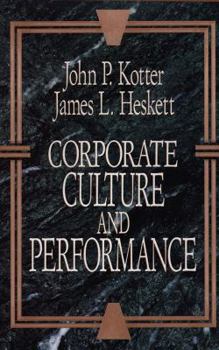Corporate Culture and Performance
Select Format
Select Condition 
Book Overview
Going far beyond previous empirical work, John Kotter and James Heskett provide the first comprehensive critical analysis of how the culture of a corporation powerfully influences its economic... This description may be from another edition of this product.
Format:Hardcover
Language:English
ISBN:0029184673
ISBN13:9780029184677
Release Date:April 1992
Publisher:Free Press
Length:224 Pages
Weight:1.16 lbs.
Dimensions:0.9" x 6.3" x 9.7"
Customer Reviews
3 ratings
important research on company performance
Published by Thriftbooks.com User , 23 years ago
If you buy into the argument that the only responsibility of a business is to its stockholders and that paying attention to areas outside of this will result in a lesser-performing company, the research of two Harvard Business School professors suggests just the opposite. John Kotter and James Heskett studied the performance of 207 large firms over an 11-year period. They wrote of their findings: "Corporate culture can have a significant impact on a firm's long-term economic performance. We found that firms with cultures that emphasized all the key managerial constituencies (customers, stockholders, and employees) and leadership from managers at all levels outperformed firms that did not have those cultural traits by a huge margin. Over an eleven-year period, the former increased revenues by an average of 682 percent versus 166 percent for the latter, expanded their work forces by 282 percent versus 36 percent, grew their stock prices by 901 percent versus 74 percent, and improved their net incomes by 756 percent versus 1 percent."Consider that final finding again: The companies that paid attention equally to customers, stockholders, and employees outperformed those that didn't in growth of net income over the 11-year period by a factor of 756. Paying attention to more than just returning profits to stockholders can have a huge payoff. Heskett and Kotter's research presented in this book is important reading for anyone tracking company performance in relation to its culture.
Intellectual, Informative Book on Corporate Culture
Published by Thriftbooks.com User , 23 years ago
This book, though it reads like a textbook or reference, provides good information about this topic and once getting past the writing style, is one that businesspeople could learn from.Practical and insightful.Read The Management Masters Series first book Corporate Culture...A must read of this topic, highly recommended.
Academic, but practical, must-read book
Published by Thriftbooks.com User , 24 years ago
Most popular and influential books on business management present the highly personal observations, interpretations, opinions, and conclusions of the author. The author's tenets - often in the form of a "newly discovered" business trend or critical success factor that business executives can ignore only at their own peril - seem objective and impersonal because they are supported by real-world examples that provide strong evidence in their support. Examples that do not support the premise are conveniently ignored or dealt with in a cursory, simplistic manner.Basically, these books are the result of sharp minds drawing conclusions from their own experience. This approach is certainly valuable and has contributed many valuable ideas about the various means of improving business performance - and probably many more faulty notions that have led management up the garden path.John Kotter and James Heskett's "Corporate Culture and Performance" sits at the other end of the spectrum from this norm. The book is in effect a report on their scientific investigations of a hypothesis. The authors set out a number of hypotheses and then test them against the hard data of long-term business performance. In doing so, they present solid insights into some of the conventional wisdom spouted by management consultants and authors of business books.The fundamental source of their hypothesis is the question "What is the relationship between corporate culture and business performance?" The fruits of their research yield important observations on the nature of this relationship.The authors' well-structured research study, and their sharp analytical abilities permit them to trek deep into the jungle of issues surrounding corporate culture. By speculating and then testing their notions against the research data, they uncover some insights that might be undervalued because they seem so intuitively obvious. One of these is central to the book, namely that "adaptive" cultures - ones that help organizations anticipate and adapt to environmental change - are the most effective at helping a company achieve good long-term financial performance.If the book and - more important - the research were not infused with the analytical skills of the authors, the book would leave the reader with a great many empirically verified observations about culture and management and an understanding of the key issues, but with no practical way of dealing with the issues.However, the authors have a lot to offer in the way of practical tips. For example, in presenting a fundamental dilemma, they follow it up with a research-tested approach for dealing with the issue:"Holding onto a good culture requires being both inflexible with regard to core adaptive values and yet flexible with regard to most practices and other values....And it requires providing strong leadership, yet not strangling or smothering delicate leadership initiatives from below...."...





